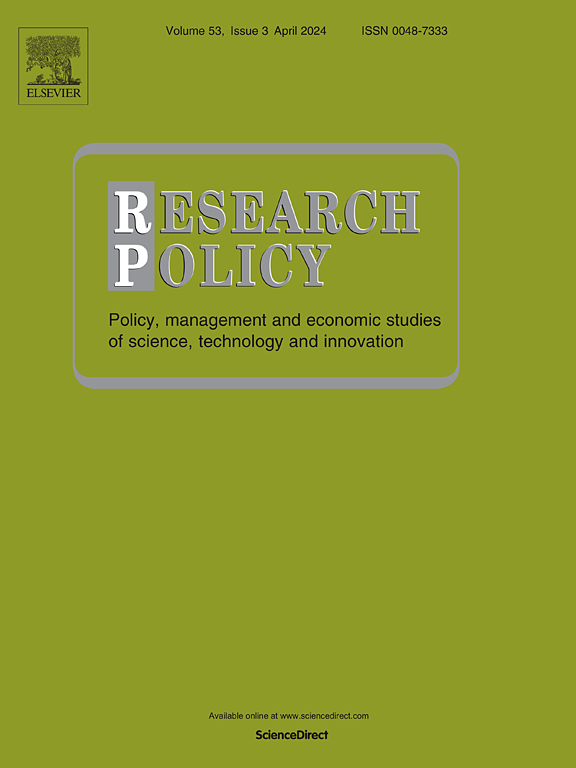Technology discontinuation as a continuous process: diesel, sustainability, and the politics of delay
IF 8
1区 管理学
Q1 MANAGEMENT
引用次数: 0
Abstract
The discontinuation of technologies - such as combustion engines, coal and nuclear power generation, or certain types of plastics - has become central to debates on sustainability, public health, and safety. Much of the existing literature and policy discourse, however, treats discontinuation as a discrete, well-defined phase at the end of a technology's lifecycle and as the implicit flipside of technology introduction. In this article, we propose conceptualizing discontinuation as a continuous process that unfolds throughout the entirety of a technology's lifespan, playing a critical role in its long-term survival. Drawing on a longitudinal, in-depth case study of diesel cars in Europe, we analyze how significant discontinuation pressures have existed for decades, repeatedly challenging, destabilizing, reconfiguring, and ultimately re-stabilizing diesel as a socio-technical system. We present a framework that captures how discontinuation efforts emerge, gain credibility, evolve, or are dismissed in relation to broader, stable imaginaries of socially desirable futures. In the case of diesel, we find that discontinuation efforts and counter-efforts specifically engaged two competing imaginaries of sustainability - one focused on local air quality and the other on global climate change - which allowed actors to strategically frame and rationalize the technology in ways that served their interests. By viewing discontinuation controversies as an inherent and continuous feature of a technology's durability, new policy options come to the fore. These include the need to shift the focus from the technology in question to what persists underneath, challenging the stability of underlying sustainability framings rather than merely reacting to moments of crisis. It also entails scrutinizing the politics of delay and the “technological neutrality”, which tend to favor continuation, and treating discontinuation policy more seriously as a form of innovation policy supported by long-term strategies, toolkits, and equivalent levels of funding.
作为一个连续过程的技术终止:柴油、可持续性和延迟的政治
内燃机、煤炭和核能发电或某些类型的塑料等技术的停止使用已成为有关可持续性、公共卫生和安全的辩论的核心问题。然而,许多现有的文献和政策论述将终止视为技术生命周期结束时的一个离散的、明确定义的阶段,并将其视为技术引入的隐含另一面。在本文中,我们建议将停产概念化为贯穿技术整个生命周期的连续过程,在其长期生存中起着关键作用。通过对欧洲柴油车的纵向、深入的案例研究,我们分析了数十年来存在的重大停产压力是如何不断挑战、破坏稳定、重新配置并最终重新稳定柴油作为一种社会技术系统的。我们提出了一个框架,该框架捕捉了与社会理想未来的更广泛,稳定的想象有关的停止努力如何出现,获得可信度,演变或被驳回。在柴油的案例中,我们发现停止使用和反使用的努力特别涉及两种相互竞争的可持续性想象——一种关注当地空气质量,另一种关注全球气候变化——这使得参与者能够以符合他们利益的方式战略性地构建和合理化技术。通过将终止争议视为技术持久性的固有和持续特征,新的政策选择脱颖而出。其中包括需要将焦点从有问题的技术转移到持续存在的基础上,挑战潜在可持续性框架的稳定性,而不仅仅是应对危机时刻。它还需要仔细审查延迟政治和“技术中立”,它们倾向于支持延续,并更认真地将终止政策视为一种由长期战略、工具包和同等水平的资金支持的创新政策。
本文章由计算机程序翻译,如有差异,请以英文原文为准。
求助全文
约1分钟内获得全文
求助全文
来源期刊

Research Policy
MANAGEMENT-
CiteScore
12.80
自引率
6.90%
发文量
182
期刊介绍:
Research Policy (RP) articles explore the interaction between innovation, technology, or research, and economic, social, political, and organizational processes, both empirically and theoretically. All RP papers are expected to provide insights with implications for policy or management.
Research Policy (RP) is a multidisciplinary journal focused on analyzing, understanding, and effectively addressing the challenges posed by innovation, technology, R&D, and science. This includes activities related to knowledge creation, diffusion, acquisition, and exploitation in the form of new or improved products, processes, or services, across economic, policy, management, organizational, and environmental dimensions.
 求助内容:
求助内容: 应助结果提醒方式:
应助结果提醒方式:


